Chem205-syllabus W2021 PDF

| Title | Chem205-syllabus W2021 |
|---|---|
| Course | Compiler Design |
| Institution | Concordia University |
| Pages | 6 |
| File Size | 241.2 KB |
| File Type | |
| Total Downloads | 92 |
| Total Views | 173 |
Summary
Download Chem205-syllabus W2021 PDF
Description
CONCORDIA UNIVERSITY DEPARTMENT OF CHEMISTRY AND BIOCHEMISTRY
COURSE SYLLABUS: CHEM 205 - GENERAL CHEMISTRY I IMPORTANT: THE MIDTERM & FINAL EXAMS FOR THIS COURSE WILL BE DONE ON-LINE VIA COLE WITH PROCTORIO PROCTORING SOFTWARE. IF FOR ANY REASON THIS REQUIREMENT DOES NOT WORK FOR YOU, PLEASE DROP THE COURSE BY THE DEADLINE.
1. GENERAL INFORMATION (all synchronous activities will be held via Zoom, not on campus) Course: Lectures: Tutorials: Laboratories: STARTING:
General Chemistry I, CHEM 205 (3 credits), Winter 2021 2.5h every week via Zoom (some of this time via prerecorded videos); see Moodle for prof’s Zoom ID. MANDATORY; 2.5h every two weeks via Zoom; see Moodle for TA’s Zoom ID. MANDATORY; 3.0h every two weeks AT HOME + Zoom; see Moodle for TA’s Zoom ID. 1st LECTURES = Jan.13-18th & MANDATORY LAB/TUT CHECK-IN = week of Jan.25 th (see p.5)
IF REPEATING COURSE: Lab exemptions must be requested before noon, Fri.Jan.15th by submitting the application form (visit http://www.concordia.ca/artsci/chemistry/programs/undergraduate/procedures-forms.html & see Student Requests) to the Chemistry Department ([email protected]). All repeating students must repeat all other parts of the course, including tutorials. Students are eligible for a lab exemption if they passed (>60%) the labs of Chem 205 in the past 24 months; students who partially completed the lab component or discontinued the course must repeat all labs/tutorials.
Instructors: Zoom IDs & Office hours – for profs, see Moodle Lecture site; for TAs, see Moodle Core Materials site Professor (Lec.04): Contact: Professor (Lec.05): Contact: Professor (Lec.52): Contact: Professor (Lec.53): Contact: TAs (lab/tut):
Dr. German Perez, Lecturer (LTA), Dept. of Chemistry & Biochemistry [email protected] (for conceptual questions, use office hours) Dr. German Perez, Lecturer (LTA), Dept. of Chemistry & Biochemistry [email protected] (for conceptual questions, use office hours) Dr. Georges Dénès, Associate Professor, Dept. of Chemistry & Biochemistry [email protected] (for conceptual questions, use office hours) Dr. Elham Ghobadi, Part-time faculty, Dept. of Chemistry & Biochemistry [email protected] (for conceptual questions, use office hours) contact information provided on course’s Core Materials Moodle website
Course Coordinator: Dr. Cerrie Rogers, Senior Lecturer, Dept. of Chemistry & Biochemistry Contact: [email protected] (re: Stemble homework & tutorial rules/issues/absences, medical notes) Lab Coordinator: Contact:
Dr. Jennifer Romero, Technician, Dept. of Chemistry & Biochemistry [email protected] (re: lab rules/issues/absences, medical/employer’s notes)
Moodle sites: Core Materials site: Lec._ section sites:
lab/tutorial/homework information, FAQs (course policies, labs, tutorials), sample finals section-specific lecture slides, videos, sample midterm exams, other information
2. COURSE DESCRIPTION Calendar description: Stoichiometry, states of matter, atomic structure, electron structure of atoms, the periodic table, periodic properties, bonding, gases. Lectures and laboratory. NOTE: This course presumes a good grounding in secondary school mathematics. Students in programs leading to the BSc degree may not take this course for credit to be applied to their program of concentration. Required background knowledge/skills: proficiency in high-school mathematics necessary (see Moodle for skills list ) Expanded course description: To solve problems of a chemical nature, scientists assess factual information, apply concepts and perform mathematical calculations. In General Chemistry I, you will memorize language and facts and learn concepts and calculations used by scientists to describe matter and the things that different types of matter do. The hands-on laboratory experiments further demonstrate how textbook chemistry is used to solve real chemical problems. Together, the theory and lab work provide the introduction to chemical thinking needed for scientists and engineers. To succeed in CHEM 205, you must regularly work through problems from the textbooks and/or online homework system, in addition to doing the readings. Start with “general” end-of-chapter questions where different chapter topics are mixed together. If you start at question #1, you’ll run out of time before you’ve ever tested yourself. Write out all problems/calculations in full to forge a strong - and fast - link between your brain and your pen. Work will be graded on both correctness and completeness.
3. OBJECTIVES Students are expected to: o Draw on background: routinely use high-school level physical science and mathematics (algebra) knowledge o Acquire knowledge: scientific method; factual information & laws; practical & abstract concepts; chemical calculations o Apply knowledge: look below surface to find causes; observe, interpret & predict; synthesize info. to solve problems o Develop skills: discipline; logic; analysis; explanation (what/how/why); problem-solving; hands-on lab techniques o Lay groundwork: for science/engineering: knowledge of matter & reaction types, & how to learn more about matter o Build independence: learn detailed lists of objectives by topic, given in chapter summaries in lecture slides & textbook
4. EXTRAORDINARY CIRCUMSTANCES In the event of extraordinary circumstances and pursuant to the Academic Regulations , the University may modify the delivery, content, structure, forum, location and/or grading scheme. If this happens, students will be informed of the changes.
1
CONCORDIA UNIVERSITY DEPARTMENT OF CHEMISTRY AND BIOCHEMISTRY
5. COURSE MATERIALS Required: Textbook:
free pdf textbook: Openstax Chemistry 2e https://openstax.org/details/books/chemistry-2e OR ~$75 ebook Chemistry & Chemical Reactivity, 10th Ed, Kotz, Treichel, Townsend & Treichel. that comes with OWLv2 interactive online system (NOT what we are using for homework) via: http://www.nelsonbrain.com/webapp/wcs/stores/servlet/en/micrositesca/Concordia-CHEM205-206
Used book? Any “General Chemistry” book is fine. Homework: Stemble system, ~$25 (free trial for 1st month), sign-in details coming via email in January Lab manual: free pdf: Chem 205, General Chemistry I (Dept. of Chem./Biochem.) on Moodle Core Materials site Equipment: kit for at-home labs, ~$130 + shipping, order ASAP (see Moodle Core Materials site for details) Readings: Openstax 2e Ch.1-4, 6-9, 13.1, 14.2, 17.1 (see p.4) OR Kotz et al 10th Ed., Ch.1-4, 19.1, 6-8, 12.3, 9.1, 10 (see p.5).
6. GRADING Participation: 5 % (TBA by lecture prof, Moodle +/- in-class polling; see Lec._ Moodle site) Homework: 8 % (4 assignments in Stemble on-line homework system, worth 2% each) Tutorial activities: 12 % (4 two-stage quizzes, worth 3% each: 1% group quiz, 2% individual) Midterm test: 20 % (online, during week of Mar.8, proctored in COLE) 35 % (cumulative, in Apr.-May exam period, proctored in COLE) . Final examination: Theory Pass Requirements: >45% average grade on (midterm + final exam) AND >50% average on all theory
Breakdown:
Laboratory reports: Lab Pass Requirement:
20 % (4 lab reports, each worth 5%) >60% average grade on lab reports required to pass course
Expectations:
application of pre-requisite knowledge (& common sense) to new concepts, situations and problems logical explanation of concepts/situations, supported by facts, drawings & calculations as appropriate objective, reasonable analysis and interpretation of laboratory observations and quantitative data
Attendance:
Labs/tutorials: if miss > 1 lab or >1 tutorial (any reason), a Repeat (R) grade is earned for course missed labs/tutorials earn zero grades, and cannot be made-up after the fact. Contact Coordinator to plan for religious holidays or medical appointments absences (max.1 each) excused if valid doctor/employer note - see Course Coordinator (for tutorials) & Lab Coordinator (for labs). Lecture participation: professors can accommodate absence from synchronous-participation activities, when appropriately justified. Contact your professor ASAP if you have an issue.
Submitted work: must be submitted directly to TAs/Moodle before or on the due date; late penalties apply (10% per day) must be legible, organized & show full calculations and explanations (justification counts for grades) if uploaded, must be a pdf file made from a clear photo of handwritten work (unless ACSD says typed) will be graded by TAs (lab & tutorial work) and by professors (participation, midterm exam, final exam) must be in your own words; logic flow & proper terminology worth more here than perfection of writing may be submitted in French, according to Concordia policy (talk to your professor if you require this) Grading scale:
A+ (≥ 90.0%), A (85-89.9%), A- (80-84.9%); B+ (76.7-79.9%), B (73.4-76.6%), B- (70-73.3%); C and D grade ranges similar to Bs.
Fail (F) grade: if earn < 50% on theory and/or 1 lab or >1 tutorial for any reason If repeating course: can request lab exemption (see top of p.1) but must repeat tutorials & all other work When a student receives a lab exemption for a lab taken at Concordia, the previous lab mark will be used again in determining the new grade. If a student receives a lab exemption based on a lab taken at another institution, the lab mark is not used again, and the course grade is based entirely on the “theory” marks obtained at Concordia.
Failing grades:
7. SCHEDULE (May be subject to change.) Important dates: Lectures: start week of Jan.13th Lab/Tut. check-in: mandatory in week of Jan.25th, at your scheduled tutorial start time (Zoom meeting ID/password on Moodle; will be put into schedule Group A/B at check-in) Chem 101: mandatory seminar Feb.3rd/4th, 20:50-21:45, Zoom TBA; quiz deadline 23:55 Feb.21st Drop deadlines: DNE (tuition refund) deadline: Tues.Jan.26 th; DSC deadline: Mon. Mar.29 th Midterm tests: week of Mar.8, during your official lecture time, in COLE, proctored Final exam: in Apr.-May exam period, in COLE, proctored
8. USE OF THIRD-PARTY SOFTWARE AND/OR WEBSITES
Stemble +/- iClicker REEF: Students are advised that external software and/or websites will be used in this course. Students may be asked to submit or consent to the submission of personal information (e.g., name and email) to register for these online services. Students are responsible for reading and deciding whether or not to agree to any applicable terms of use. Use of this software and service is voluntary. Students who do not consent to the use the software or service should identify themselves to the course instructor as soon as possible, and in all cases before the DNE deadline, to discuss alternate modes of participation. Institution tools: Moodle, Zoom, Yuja, Office365 (O365), COLE, and Proctorio are recognized as institutional tools by Concordia. Professors are not required to accommodate students who wish to opt-out of sharing data with these sites/tools.
2
CONCORDIA UNIVERSITY DEPARTMENT OF CHEMISTRY AND BIOCHEMISTRY
9. BEHAVIOUR (RIGHTS AND RESPONSIBILITIES OF THE STUDENT) Be professional: All individuals participating in this course are expected to be professional and constructive throughout the
course, including in ALL communications (verbal, written, face-to-face, on-line) with ALL faculty, staff and students. Concordia students are subject to the Code of Rights and Responsibilities(https://www.concordia.ca/content/dam/common/docs/policies/officialpolicies/BD-3.pdf) when engaged physically and/or virtually in any University activity, e.g., classes, seminars, meetings, labs, etc.
Contribute to a positive learning environment: Disruptive or disrespectful behaviour will not be tolerated in any Concordia environments: classrooms, labs, tutorials or on-line. Students engaging in inappropriate behaviour will be asked to leave, without the opportunity to make up the missed work. Read the Core Materials Moodle site during the first week of classes: Full explanations of the course policies, activities, st and helpful tips are provided as FAQs (frequently asked questions). Please read it before the end of the 1 week of class. By registering for the course, you are agreeing to follow these rules. The information will remain accessible all term for your reference. If you have questions, please ask the Course Coordinator, Lab Coordinator or Professor (depending on topic).
Be prepared for lectures, tutorials & labs: (for lab check-in only: no preparation required) Lectures: Read/watch the provided lecture materials before class & answer any feedback questions required by your professor, and then be ready to (i) answer questions (including calculations) during the lecture and (ii) engage in discussion with classmates to clarify each others’ understanding. Tutorials: Do exercises & study assigned topics, and then be ready to (i) participate in TA-led review exercise and (ii) write a two-stage quiz (complete a quiz in small groups, then write similar quiz individually). Labs: Read the experiment thoroughly & complete the pre-laboratory exercises (individually), and then be ready to (i) perform the experiment at home, with a lab partner and TA with you via Zoom, and (ii) write a lab report based on your data (individually). Complete the “Chem 101” seminar + quiz on the Academic Code of Conduct & Ethical Use of Information Sources: MANDATORY SEMINAR & QUIZ: As part of this course, you are required to (i) attend the “Chem 101” seminar on academic integrity, the academic code of conduct and the appropriate use of information sources + (ii) earn 100% on the “Chem 101” Moodle on-line quiz. (Note: This is not the University's quiz you may have taken when you first registered and logged into the myConcordia portal; the Chem 101 quiz is graded by the Department of Chemistry and Biochemistry, and you cannot take it until after you have attended the seminar.) The aim of the seminar and quiz is to clarify the code of conduct in terms of what practices are considered unacceptable in work submitted for grading in Chemistry & Biochemistry courses. You are exempt from this requirement ONLY if you already did both (i) and (ii) in Winter 2016 or more recently;* otherwise, you must complete both this term. *You are exempt if you can locate your ID in the pdf file located on the Departmental web site (http://www.concordia.ca/content/dam/artsci/chemistry/docs/compliance-list.pdf). The seminar (1 hour) will be held on Feb.3 rd & 4 th at 20:50-21:45pm. As space for each Zoom seminar is limited, please register for your preferred timeslot (Zoom & registration details TBA.) IMPORTANT: Late-comers will not be admitted, and attendance will be taken at the seminar. If you do not complete Chem 101, your final CHEM 205 grade will be lowered by one letter grade and carry an incomplete notation (e.g., C+/INC if you earned a B-). Please refer to the Department website FAQs or the Undergraduate Calendar (section 16.3.6) for details on removing an INC notation (thus restoring your grade) via the “Late Completion” process. The Concordia University academic code of conduct can be found in section 17.10 of the current academic calendar (http://www.concordia.ca/academics/undergraduate/calendar/current/17-10.html). Any form of unauthorized collaboration, cheating, copying or plagiarism found in this course will be reported and the appropriate sanctions applied. The Chem 101 seminar is a clear and fair opportunity to learn what our faculty regards as academic misconduct. Failure to take part in this learning opportunity and thus ignorance of these regulations is no excuse and will not result in a reduced sanction in any case where academic misconduct is observed. Demonstrate academic integrity: (Source: Academic Integrity Website, www.concordia.ca/students/academic-integrity/plagiarism.html)
Plagiarism: The most common offense under the Academic Code of Conduct is plagiarism, which the Code defines as “the presentation of the work of another person as one’s own or without proper acknowledgement”. This could be material copied word for word from books, journals, internet sites, professor’s course notes, etc. It could be material that is paraphrased but closely resembles the original source. It could be the work of a fellow student, for example, an answer on a quiz, data for a lab report, or a paper or assignment completed by another student. It might be a paper purchased through one of the many available sources. “Presentation” is not limited to written work – it can also refer to copying images, graphs, tables, ideas, oral presentations, computer assignments and artistic works. Finally, if you translate the work of another person into French or English and do not cite the source, this is also plagiarism. In simple words: DO NOT COPY, PARAPHRASE OR TRANSLATE ANYTHING FROM ANYWHERE WITHOUT SAYING FROM WHERE YOU OBTAINED IT!
10. INTELLECTUAL PROPERTY RIGHTS (IP) No sharing/reposting: Content belonging to instructors shared in online courses, including, but not limited to, online lectures, course notes, and video recordings of classes remain the intellectual property of the faculty member. It may not be distributed, published or broadcast, in whole or in part, without the express permission of the faculty member. Any unauthorized sharing of course content may constitute a breach of the Academic Code of Conduct and/or the Code of Rights and Responsibilities. Get permission to record: Students are also forbidden to use their own means of recording any elements of an online class or lecture without express permission of the instructor. Your work is yours: As specified in the Policy on Intellectual Property, the University does not claim any ownership of or interest in any student intellectual property (IP). All university members retain copyright over their work.
3
CONCORDIA UNIVERSITY DEPARTMENT OF CHEMISTRY AND BIOCHEMISTRY
CHEM 205 – COURSE OUTLINE & READINGS (for OPENSTAX, Chemistry 2e) Suggestions on how to approach lectures: o Slides and/or videos will be posted on Moodle 3-4 days before class. Work through them BEFORE class time. o Read upcoming textbook sections before each class. Lectures are intended to clarify your understanding of the topics covered in the text and to get you actively thinking about the material. Lectures do not replace readings, & vice versa. o Take notes during class to recall the explanations & discussion. Don’t waste time copying down what is on the slides! o Think actively during class. When given the opportunity, answer in-class questions and discuss material with your classmates – research shows that active participation improves both understanding and retention. Many problems will be solved during class time.
Chapter title
List of topics (Note: professor may add supplementary material and/or cover topics in a different order)
Essential Ideas
Why study chemistry! Chemistry in context. Domains, Phases, Matter, classification, Physical and Chemical Properties, Measurements, Mathematical Treatment
Atoms, Molecules, and Ions
Atomic structure, Symbolism, Chemical formulas; The periodic table; Molecules, compounds & formulas; Ionic compounds – formulas, names & properties
Composition of Substances and Solutions
Atoms, molecules & the mole Chemical analysis – determining compound formulas; Instrumental Analysis – determining compound formulas, Empirical formula and molecular formula, Molarity and Solutions
Stoichiometry of Chemical Reactions
Chemical Bonding & Molecular Geometry
Text readings
1.1 - 1.6
2.1 - 2.7
3.1 - 3.5
Introduction to Writing and Balancing chemical eq...
Similar Free PDFs

IMM250 Syllabus W2021
- 7 Pages
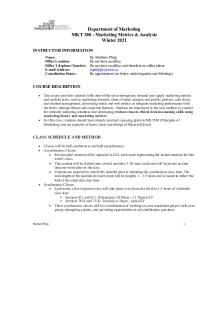
MKT300Course Outline W2021
- 11 Pages

Course Syllabus-W2021
- 5 Pages

Chem205-syllabus W2021
- 6 Pages
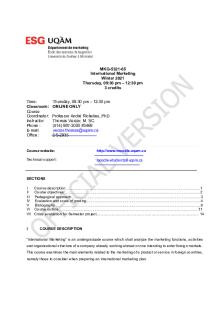
MKG5321 065 Course outline W2021
- 17 Pages
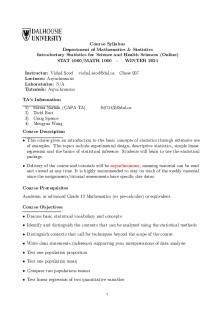
Syllabus STAT 1060 W2021
- 7 Pages
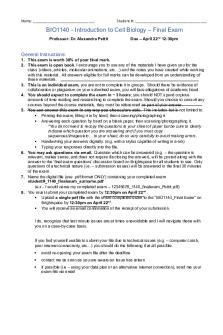
BIO1140 Final Exam W2021 Student
- 12 Pages
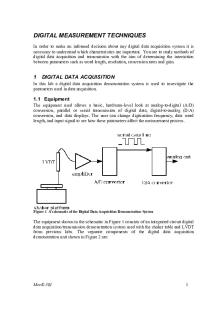
Mec E301 Lab02 Digital-W2021
- 9 Pages
Popular Institutions
- Tinajero National High School - Annex
- Politeknik Caltex Riau
- Yokohama City University
- SGT University
- University of Al-Qadisiyah
- Divine Word College of Vigan
- Techniek College Rotterdam
- Universidade de Santiago
- Universiti Teknologi MARA Cawangan Johor Kampus Pasir Gudang
- Poltekkes Kemenkes Yogyakarta
- Baguio City National High School
- Colegio san marcos
- preparatoria uno
- Centro de Bachillerato Tecnológico Industrial y de Servicios No. 107
- Dalian Maritime University
- Quang Trung Secondary School
- Colegio Tecnológico en Informática
- Corporación Regional de Educación Superior
- Grupo CEDVA
- Dar Al Uloom University
- Centro de Estudios Preuniversitarios de la Universidad Nacional de Ingeniería
- 上智大学
- Aakash International School, Nuna Majara
- San Felipe Neri Catholic School
- Kang Chiao International School - New Taipei City
- Misamis Occidental National High School
- Institución Educativa Escuela Normal Juan Ladrilleros
- Kolehiyo ng Pantukan
- Batanes State College
- Instituto Continental
- Sekolah Menengah Kejuruan Kesehatan Kaltara (Tarakan)
- Colegio de La Inmaculada Concepcion - Cebu







